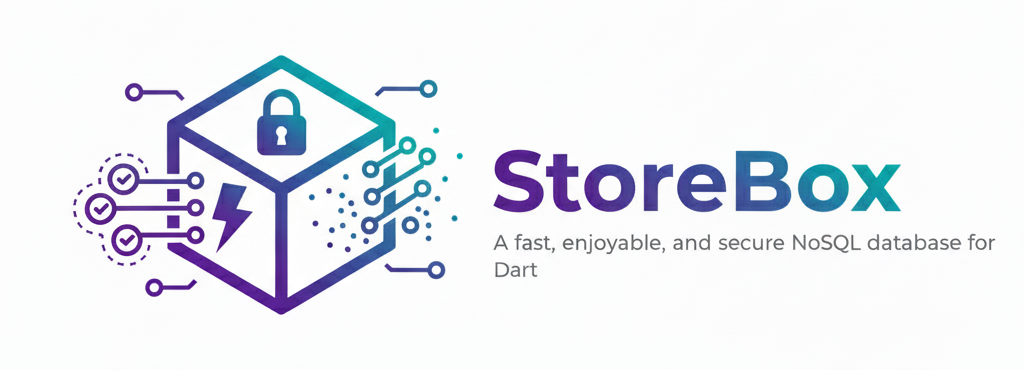store_box 2.0.0  store_box: ^2.0.0 copied to clipboard
store_box: ^2.0.0 copied to clipboard
A fast, enjoyable, and secure NoSQL database written in pure Dart.
StoreBox #

A fast, enjoyable, and secure NoSQL database for Flutter & Dart. Store any Dart object with a simple, modern API and built-in encryption.**
store_box is designed to be a lightweight and powerful local database, focusing on a simple and powerful developer experience without requiring code generation.
Why Choose store_box? #
🚀 Zero Boilerplate: No build_runner, no generated .g.dart files. Just write your TypeAdapter and you're ready to go.
💡 Simple, Modern API: The static API is intuitive and easy to learn, whether you're a beginner or an expert.
🔒 Secure by Default: Built-in AES-256 encryption is easy to enable for sensitive data.
❤️ Flutter First: Built for Flutter. Works everywhere Flutter does—iOS, Android, Web, Desktop.
Getting Started #
1. Add to pubspec.yaml #
Add store_box to your package's pubspec.yaml file.
dependencies:
store_box: ^2.0.0
2. Initialize in Your App #
You must initialize store_box before your app starts. This prepares the database for use and should be done once.
// main.dart
import 'package:flutter/material.dart';
import 'package:store_box/store_box.dart';
void main() async {
// Required for all Flutter apps
WidgetsFlutterBinding.ensureInitialized();
// Initialize StoreBox. That's it!
await StoreBox.init();
runApp(const MyApp());
}
How to Use #
1. For Beginners: Simple Key-Value Storage #
This is the easiest way to use store_box. It's perfect for saving simple data like user settings, session tokens, or flags without any extra setup.
After you init() the package, you can immediately use the static put() and get() methods anywhere in your app.
// Save a boolean value to the default storage
await StoreBox.put('darkMode', true);
// Save a username
await StoreBox.put('username', 'Alice');
// Read the values back
final bool isDarkMode = StoreBox.get('darkMode') ?? false;
final String? user = StoreBox.get('username');
print('Dark Mode is enabled: $isDarkMode');
print('Current user: $user');
You can store any basic Dart type: String, int, double, bool, List, and Map.
For Advanced Users: Storing Custom Objects #
When you need to store your own data models (like a User or Product class), you need to tell store_box how to save and load them. You do this by creating a TypeAdapter.
Step 1: Create Your Model and TypeAdapter #
A TypeAdapter is an instruction manual that store_box uses to understand your custom object.
import 'package:store_box/store_box.dart';
import 'package:store_box/src/binary/binary_reader.dart';
import 'package:store_box/src/binary/binary_writer.dart';
// Your custom class
class User {
final String name;
final int age;
User({required this.name, required this.age});
}
// The instruction manual for the User class
class UserAdapter extends TypeAdapter<User> {
@override
final int typeId = 1; // Each type needs a unique, positive ID
@override
User read(BinaryReader reader) {
// Read the fields in the exact same order you wrote them
final name = reader.read() as String;
final age = reader.read() as int;
return User(name: name, age: age);
}
@override
void write(BinaryWriter writer, User obj) {
// Write the fields of the object
writer.write(obj.name);
writer.write(obj.age);
}
}
Step 2: Register the Adapter #
In your main.dart file, register the adapter after you initialize StoreBox. This should only be done once.
// main.dart
void main() async {
WidgetsFlutterBinding.ensureInitialized();
await StoreBox.init();
// Register your adapter so StoreBox knows about it
StoreBox.registerAdapter(UserAdapter());
runApp(const MyApp());
}
Step 3: Open a Box and Use It #
Now you can open a dedicated, typed "box" to store your custom objects.
// Open a box specifically for User objects
final userBox = await StoreBox.openBox<User>('users');
// Save a User object
await userBox.put('user_123', User(name: 'Alice', age: 30));
// Read the User object back
final alice = userBox.get('user_123');
print(alice?.name); // Prints "Alice"
3. Using Encryption #
Protect sensitive data by providing an encryptionKey when you open a box. This works for both simple and custom object boxes.
import 'dart.convert';
// Key must be 32 bytes for AES-256.
// For production, use a secure key management strategy.
final encryptionKey = utf8.encode('a_very_strong_32_byte_secret_key');
final secretBox = await StoreBox.openBox(
'secrets',
encryptionKey: encryptionKey,
);
await secretBox.put('apiKey', '123-ABC-789');
print(secretBox.get('apiKey')); // Prints "12-ABC-789"
Coming Soon! #
An optional code generator package (store_box_generator) is in development to make working with custom objects even easier!
Contributing #
Contributions are welcome! If you find a bug or have a feature request, please open an issue on GitHub.
License #
MIT License
Copyright (c) 2025 Riazul Islam
Permission is hereby granted, free of charge, to any person obtaining a copy of this software and associated documentation files (the "Software"), to deal in the Software without restriction, including without limitation the rights to use, copy, modify, merge, publish, distribute, sublicense, and/or sell copies of the Software, and to permit persons to whom the Software is furnished to do so, subject to the following conditions:
The above copyright notice and this permission notice shall be included in all copies or substantial portions of the Software.
THE SOFTWARE IS PROVIDED "AS IS", WITHOUT WARRANTY OF ANY KIND, EXPRESS OR IMPLIED, INCLUDING BUT NOT LIMITED TO THE WARRANTIES OF MERCHANTABILITY, FITNESS FOR A PARTICULAR PURPOSE AND NONINFRINGEMENT. IN NO EVENT SHALL THE AUTHORS OR COPYRIGHT HOLDERS BE LIABLE FOR ANY CLAIM, DAMAGES OR OTHER LIABILITY, WHETHER IN AN ACTION OF CONTRACT, TORT OR OTHERWISE, ARISING FROM, OUT OF OR IN CONNECTION WITH THE SOFTWARE OR THE USE OR OTHER DEALINGS IN THE SOFTWARE.


